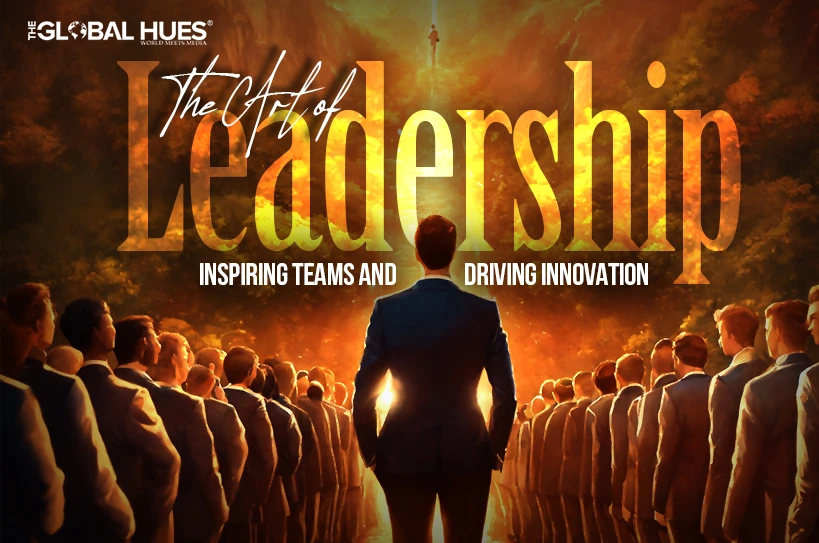Imagine you’re in a team meeting and the leader walks in – not with a lengthy report but with a brilliant idea that instantly sparks excitement in the meeting room. The energy in the room shifts, and suddenly, everyone’s brainstorming and bouncing off each other’s ideas. That’s what differentiates a great leader from a good leader.
Think of how Steve Jobs pushed his team to think differently and change the world with the iPhone. Think of Richard Branson, who turned Virgin into a global empire by trusting his team and giving them the freedom to innovate. What do these leaders have in common? Their great leadership!
What makes them kick? How do they build teams that perform like well-oiled machines while encouraging creative sparks to fly? Let’s dive into some strategies and qualities that make leaders unforgettable.
1. VISIONARY THINKING – Elon Musk
“For me it was never about money, but solving problems for the future of humanity.”
Who doesn’t know about the wealthiest man in history? We all are very well aware of the man behind Tesla and SpaceX, Elon Musk. His leadership is often defined by his ability to envision the future and turn those visions into reality, which has been key to his success in industries like electric vehicles, space exploration, and renewable energy. His role at Tesla and SpaceX illustrates the power of a clear, ambitious vision in leading teams through challenges and setting them up for success.
SpaceX’s mission, set by Elon Musk, to make space travel affordable and accessible was all about inspiring a new era in space exploration. Brains at SpaceX are brilliant engineers who are working on projects that could define the future of humanity. Likewise, at Tesla, Musk’s vision to accelerate the world’s transition to sustainable energy is one of the primary reasons people are passionate about the company.
This shows how Elon Musk’s aptness to look into the future keeps this team zealous and driven towards work.
What is the Takeaway?
One key to great leadership is encouraging innovation by guiding the team through challenging, yet inspiring goals. The focus should not only be on present goals but also on how today’s work shapes tomorrow, to keep the team motivated and inspired.
2. EMPOWERMENT AND DELEGATION- Richard Branson
“As a leader of people, you have to be a great listener, a great motivator, be very good at praising and bringing out the best in people.”
Richard Branson, the Founder of Virgin Group is often admired for his charismatic and empowering leadership style. Branson’s leadership style involves connecting with the team through personal stories. He shares his challenges and triumphs to present himself as a relatable role model. He also emphasises the significance of listening to employees and encourages them to think out of the box and share ideas.
He is down-to-earth and an easy-to-talk leader who prefers to work alongside his employees rather than following the hierarchy and positioning himself above them. A cornerstone of Branson’s leadership philosophy is his openness to risk-taking and boundary-pushing. He creates an environment where employees feel encouraged to experiment and innovate.
Another important leadership quality that can be seen in Branson is transparency and trust. He fosters open communication within his teams, ensuring that everyone feels valued and heard.
What is the Takeaway?
Trusting the team, giving them room to take risks, and leading through genuine relationships often produce productive outcomes.
3. GROWTH MINDSET – Satya Nadella
“We need to be always learning and insatiably curious. We need to be willing to lean into uncertainty, take risks and move quickly when we make mistakes, recognizing failure happens along the way to mastery.”
Satya Nadella has been serving as the Chief Executive Officer of Microsoft since 2014. After becoming the company’s CEO, he has focused on fostering a culture of empathy, inclusivity, and continuous learning in a company that has a net worth of around $3 trillion (as of November 2024).
In these years, Nadella has shifted the company’s culture from a “know-it-all” attitude to a “learn-it-all” approach and encouraged employees to embrace failure as a learning opportunity. As he allowed his team to innovate and experiment freely, it led to the creation of a culture where innovation thrives and employees feel valued.
His focus on empathy has also helped Microsoft transform into a more inclusive and collaborative workplace. His vision has positioned the company high in emerging areas like quantum computing, artificial intelligence, and more, thus positioning it as a leader in the tech industry.
What is the Takeaway?
Cultivating a culture where learning and curiosity are at the core of your team’s mindset is extremely important. This encourages the team to push boundaries and achieve greater heights.
4. CUSTOMER OBSESSION – Jeff Bezos
“We’re not competitor obsessed, we’re customer obsessed. We start with the customer and we work backwards.”
Jeff Bezos is popularly known for revolutionising e-commerce. But how did he do it? This visionary entrepreneur has always followed one rule – focus on the customers. He encourages his team to think backwards from customer needs and desires, ensuring that all initiatives are aligned with delivering superior customer experiences.
Moreover, one of the very prominent reasons behind Amazon’s evolution from a simple online bookstore to a global retail leader is its focus on hiring people who would not only be culturally fit but also those who push the company to greater heights.
Under Bezos’s leadership, Amazon has created a culture of experimentation. He encourages his team to take risks and experiment with new ideas, even if they fail. This risk-taking culture helps teams constantly innovate and push boundaries in ways that lead to breakthrough products and services.
What is the Takeaway?
Customers are the heart of any business. Leading the team to constantly think about how their work can improve customer experiences, can garner maximum benefits for the company.
5. AUTHENTICITY – Oprah Winfrey
“The secret is authenticity. The reason people fail is because they’re pretending to be something they’re not.”
Oprah Winfrey is absolutely a leader to emulate. She has built Harpo Productions centred around authenticity and empathy. She encourages her teams to bring their authentic selves to work. She believes that when people feel understood and valued, they perform better. Her leadership is also about listening actively and making her teams feel heard and respected.
She never hesitates to delegate leadership responsibilities to those around her, trusts her teams with autonomy and encourages them to take initiative and innovate.
What is the Takeaway?
Authenticity in leadership creates trust and emotional connection with the team.
6. COLLABORATION AND TRANSPARENCY – Mark Zuckerberg
“We talk about this concept of openness and transparency as the high-level ideal that we’re moving towards at Facebook. The way that we get there is by empowering people to share and connect. The combination of those two things leads the world to become more open.”
Mark Zuckerberg highly emphasises creating an open communication culture within his company. This is evident in his efforts to allow teams across the globe to have a unified mission, making it clear what Facebook stands for and how each team’s efforts contribute to the company’s larger goals.
He encourages his team to be transparent with each other about successes and setbacks. He also focuses on creating a culture of continuous learning, with employees encouraged to share feedback, communicate openly, and collaborate across departments.
What is the Takeaway?
It is crucial to encourage open dialogue within your teams. When people understand the larger vision and have the freedom to express their ideas, innovation and growth follow.
7. ETHICAL LEADERSHIP – Ratan Tata
“Apart from values and ethics which I have tried to live by, the legacy I would like to leave behind is a very simple one – that I have always stood up for what I consider to be the right thing, and I have tried to be as fair and equitable as I could be.”
Ratan Tata is known for his ethical leadership and long-term vision, which has greatly influenced the success of Tata Group, one of India’s largest and most respected conglomerates. Ratan Tata’s approach is marked by integrity, social responsibility, and a focus on long-term growth rather than immediate profits.
One of Tata’s most remarkable contributions to leadership had been his focus on business ethics. Whether through the decision to refuse bribery offers or his efforts to make the Tata Group a globally respected organisation, Tata instilled a culture of fairness and transparency within the company.
He had consistently demonstrated the importance of looking beyond immediate profits to create value that positively impacts society.
What is the Takeaway?
Lead with a strong sense of ethics and responsibility.
8. PURPOSE AND PASSION – Kiran Mazumdar Shaw
“As an entrepreneur, reinvent yourself all the time. An entrepreneur has to challenge his business model to get the best advantage of the future.”
A global influencer, a leading biotechnologist, a healthcare visionary and a passionate philanthropist, Kiran Mazumdar Shaw is an inspiration for all. Her leadership style is all about getting people excited about science. She makes sure to practice what she preaches – the value system, the philosophy, the strategy. She believes in leading from the front and facing all the challenges head-on because difficulties give much more knowledge about the way you are building your success.
Moreover, by addressing healthcare challenges through affordable biotechnology solutions, she inspires her team to work towards Biocon’s mission of making healthcare accessible to everyone. Her ability to lead with a sense of purpose makes her team feel united by shared goals.
What is the Takeaway?
Always have a sense of purpose to inspire the team to work towards shared goals.




